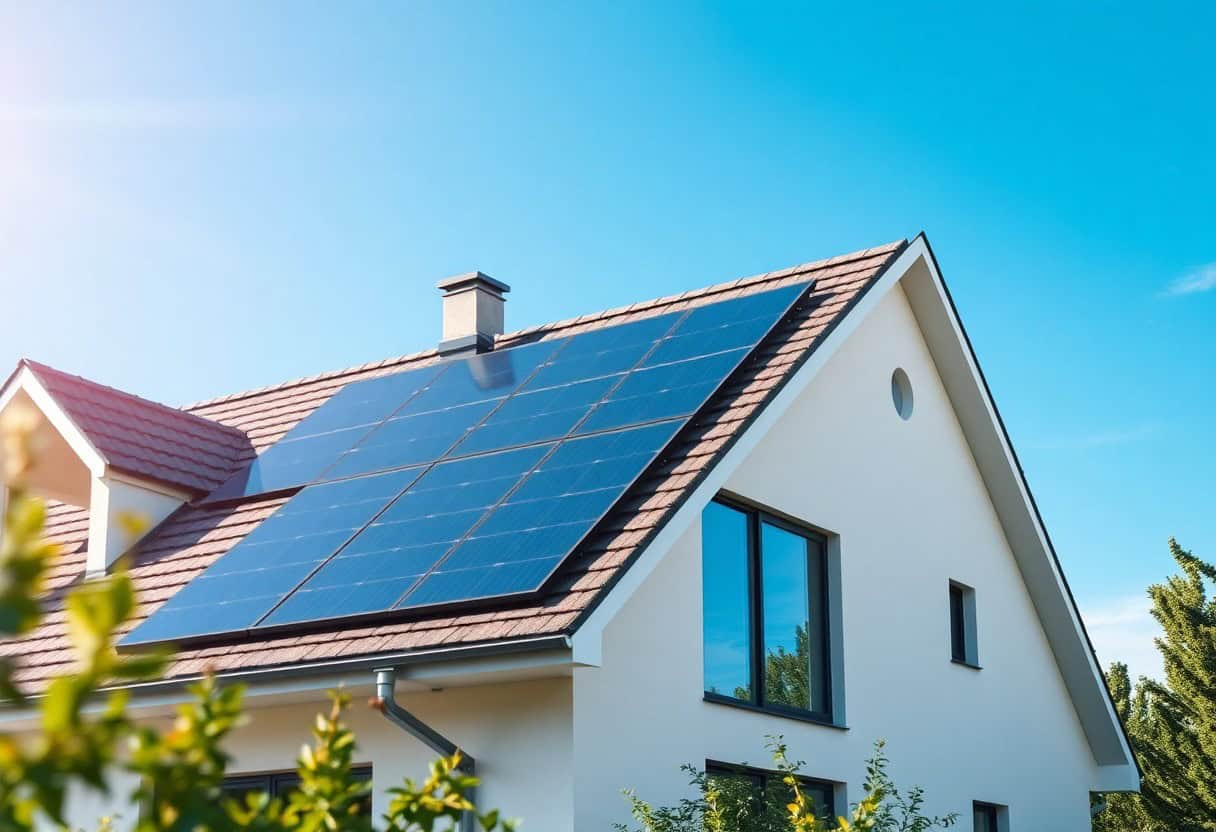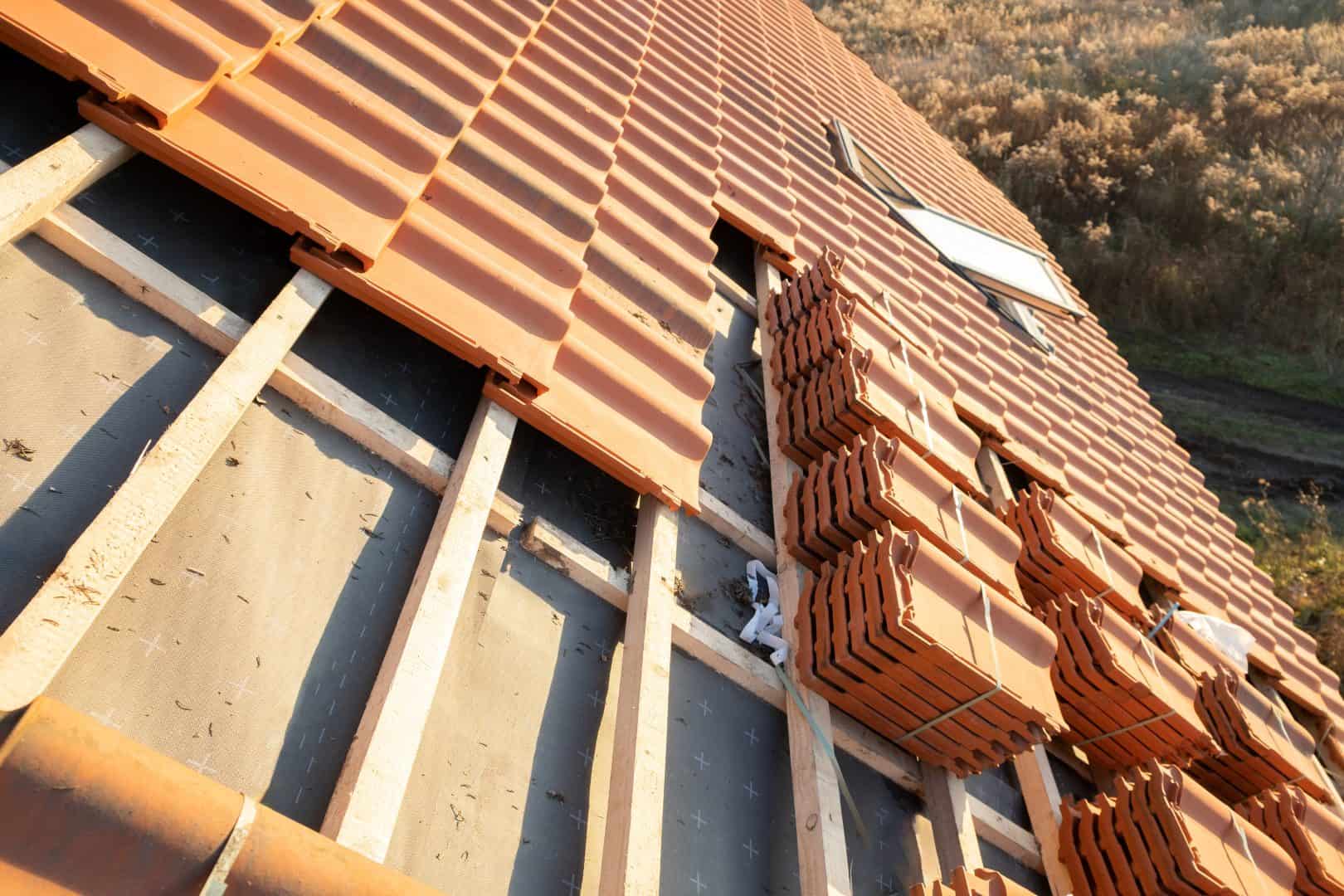Can I install solar panels on my new roof?
Fill Out The Form And We'll Get Back To You

Over the past few years, solar energy has gained significant popularity, prompting many homeowners like you to consider the potential of solar panels. If you’re contemplating whether to install solar panels on your new roof, it’s important to understand the factors that can influence this decision, such as roof type, orientation, and your location’s solar energy regulations. In this article, we will explore the key considerations to help you determine if your new roof is suitable for solar panel installation.
Benefits of Installing Solar Panels on Your Roof
To consider solar panels for your new roof is to explore numerous advantages. Installing solar panels can significantly reduce your electricity bills, enhance your property’s value, and provide sustainable energy for your household. Moreover, as you contribute to reducing reliance on fossil fuels, you’ll actively participate in combating climate change. Investing in solar energy not only benefits you financially but also positions you as a responsible steward of the environment.
Environmental Impact
Benefits of installing solar panels are seen not just in your wallet, but also in the environment. By harnessing solar energy, you decrease your carbon footprint, reducing reliance on non-renewable energy sources. This shift leads to cleaner air and a healthier planet, ensuring sustainable resources for future generations. In adopting solar technology, you play a part in the global movement towards renewable energy and the preservation of natural ecosystems.
Financial Savings
Environmental benefits aside, financial savings are one of the most compelling reasons to install solar panels on your roof. You will notice a substantial reduction in your energy bills as solar panels generate electricity, allowing you to utilise clean energy rather than relying solely on your utility provider. Over time, these savings can accumulate to a significant amount, providing a solid return on your investment as energy prices continue to rise.
Impact is further amplified by government incentives and rebates that can substantially lower the initial costs of installation. Many regions offer these financial support systems to encourage the adoption of renewable energy. Additionally, the value of your home may increase, making it a wise investment choice. With rising demand for energy efficiency, properties equipped with solar panels can attract environmentally conscious buyers, further solidifying your financial gain from the installation.
Assessing Roof Suitability
Now that you’ve installed a new roof, it’s vital to evaluate its suitability for solar panels. Key factors to consider include the roof’s condition, orientation, and angle, which all contribute to the efficiency and durability of your solar energy system. Taking these elements into account will ensure you make an informed decision about your solar investment.
Roof Condition
Behind every successful solar installation lies a solid roof structure. Before you proceed, assess your roof for any damages or signs of deterioration. It’s important to ensure that your roof is in good repair, as solar panels will be a long-term installation. If any issues exist, consider addressing them prior to installation for optimal performance.
Roof Orientation and Angle
Along with the roof’s condition, the orientation and angle play significant roles in solar panel efficiency. Ideally, south-facing roofs receive the most sunlight, while roofs that are too flat or steep might not harness energy as effectively. The proper angle allows your solar panels to capture sunlight at the right intensity throughout the day.
Roof orientation and angle are vital for maximising solar energy production. A south-facing roof with a pitch of about 30 degrees typically yields the best results, capturing sunlight effectively across all seasons. If your roof doesn’t meet these ideal conditions, you might still install solar panels; just be aware that their performance may be compromised. Various mounting options can help adjust the angle of the panels, further enhancing energy collection on less-than-ideal roofs.
Types of Roofs Compatible with Solar Panels
There’s a variety of roof types compatible with solar panels, making it easier for you to switch to renewable energy. Some common types include:
- Asphalt Shingle Roofs
- Metal Roofs
- Flat Roofs
- Tile Roofs
- Slate Roofs
Perceiving the compatibility of your roof type is fundamental in determining if you can efficiently install solar panels. For further details, check out Do I Need to Replace My Roof Before Going Solar?.
| Roof Type | Notes |
|---|---|
| Asphalt Shingle | Most common and easy to install on. |
| Metal | Durable and recyclable material. |
| Flat | Requires special mounting systems. |
| Tile | May need special mounting due to weight. |
| Slate | Heavy and requires careful installation. |
Asphalt Shingle Roofs
About 70% of residential roofs are made from asphalt shingles, and these roofs are typically ideal for solar panel installation. They support a variety of mounting systems, making it easy for you to harness solar energy.
Metal Roofs
Shingle roofs are merely one option; metal roofs also provide excellent opportunities for solar installation. Their durability offers an extended lifespan, meaning you won’t have to worry about frequent replacements disrupting your solar setup.
Roofs made from metal are often coated with reflective materials that can enhance energy efficiency, providing a dual benefit. Furthermore, the longevity of metal roofs means they can last as long as your solar system’s lifespan, making them a fantastic investment.
Flat Roofs
Types of flat roofs can be particularly advantageous for solar panel installations, especially if you have a commercial property. This design allows for optimal panel positioning to capture sunlight effectively.
And, since flat roofs can accommodate flexible installation options like ballasted mounting systems, you can easily adjust your panels’ angle to maximise sunlight exposure throughout the day, enhancing energy production.
Installation Process Overview
Your journey to installing solar panels on your new roof begins with a detailed overview of the installation process. Ensure you are well-prepared by seeking information on how to get everything ready, especially if you’re planning on redoing your roof soon, with the eventual goal of putting solar panels on it. The installation process typically involves site assessment, obtaining necessary permits, and the actual installation of the solar panels.
Site Assessment
Site assessment plays a pivotal role in determining the suitability of your new roof for solar panel installation. This involves an evaluation of factors such as roof orientation, shading, structural integrity, and available space. Engaging professionals can aid in providing you with a comprehensive analysis of these elements.
Permitting and Regulations
Process compliance with local regulations and obtaining the necessary permits are crucial steps in solar panel installation. Each locality may have specific requirements related to building permits, zoning regulations, and safety codes that you must adhere to.
With proper planning, you can navigate the permitting process smoothly. Contacting your local authority early in the journey is advisable, as they can outline the required documentation and timelines. Fulfilling these requirements ensures that your installation adheres to safety standards and regulations, safeguarding your investment.
Solar Panel Installation
Along with the preceding steps, the actual installation of solar panels involves mounting the solar panels securely on your roof structure. This phase typically necessitates skilled technicians who can ensure that the panels are positioned correctly for maximum energy efficiency.
Further, professionals will connect your solar panels to the electrical system of your home, thereby allowing you to harness solar energy effectively. They will also conduct thorough checks and testing to confirm that everything is functioning correctly, culminating in a successful solar panel installation.
Maintenance Considerations
After you have installed solar panels on your new roof, regular maintenance is imperative to ensure optimal performance. This includes routine inspections and cleaning, which can significantly influence the efficiency of your system. For details on timing and conditions, check out Should I Replace My Roof Before Going Solar? – Blog.
Routine Inspections
Before proceeding with your solar panel installation, it’s advisable to schedule routine inspections. Regular checks can identify potential issues such as roof damage or shading that could affect energy production.
Cleaning Solar Panels
Considerations regarding the cleaning of your solar panels should not be overlooked, as dirt and debris can hinder their efficiency. Regular cleaning, especially in areas prone to dust, bird droppings, or pollen, ensures that your panels operate at their best.
It is recommended to clean your solar panels at least once or twice a year, or more frequently if you notice significant dirt accumulation. Use a soft brush or sponge with mild detergent and water to avoid scratching the surface. If your panels are difficult to access or require specialised cleaning methods, hiring a professional service may be the best option to ensure they remain in optimal condition.
Common Myths About Solar Panels
Keep in mind that there are several myths surrounding solar panels that may cloud your judgement. Many people believe that solar panels are only effective in sunny climates or that they will damage your roof. In reality, solar technology has advanced significantly, making it viable for various environments and safe for most roofing types. It’s important to educate yourself on these misconceptions before making a decision.
Solar Panels and Roof Damage
Around the topic of solar panel installation, you might be concerned about potential roof damage. However, reputable installation companies use mounting systems designed to protect your roof rather than harm it. When correctly installed, solar panels can actually help preserve your roof by providing an extra layer of protection against the elements.
Performance in Cloudy Weather
Roof solar panels are often thought to be ineffective during cloudy days. This belief can be misleading. Solar panels can still generate electricity even in overcast conditions, albeit at a reduced capacity. Modern solar technology is designed to harness even diffused sunlight, ensuring that your energy production remains consistent despite less than ideal weather.
Hence, it’s worth noting that solar panels can operate efficiently in cloudy weather, capturing diffuse sunlight to generate power. Although performance may dip on particularly overcast days, many systems have proven effective during varied weather conditions. Hence, the potential for energy production should not deter you from considering solar panels, as they are continually adapting to ensure efficiency in diverse environments.
To wrap up
Following this, you can indeed install solar panels on your new roof, provided it meets the necessary structural integrity and orientation for optimal energy capture. It’s important to consult with a professional installer who can assess your roof’s suitability and advise on any local regulations. By taking these steps, you can effectively harness solar energy, leading to sustainable benefits for your home and the environment.
FAQ
Q: Can I install solar panels on any type of new roof?
A: Generally, solar panels can be installed on various types of roofs, including pitched, flat, and even tiled roofs. However, the suitability may depend on the materials used for your roof, its orientation, and the angle of the pitch. Shingle, metal, and clay tile roofs are often compatible with solar panel installations. It is advisable to consult with a solar panel installer to assess your specific roof type and conditions.
Q: Will installing solar panels void my roofing warranty?
A: This can vary depending on the roofing manufacturer and your specific warranty terms. Some warranties may be unaffected by solar panel installation, while others may stipulate conditions that could lead to voiding coverage. It is imperative to discuss your intentions with your roofing contractor and review the warranty documents prior to the installation, ensuring that all necessary precautions are taken to maintain your warranty.
Q: What are the benefits of installing solar panels on a new roof?
A: Installing solar panels on a new roof offers several benefits. First, a new roof is likely to be in good condition, which means it can support the weight and installation process of solar panels effectively. Secondly, incorporating solar panels at this stage can enhance your home’s energy efficiency, reduce long-term energy costs, and may increase property value. Additionally, doing it during new roof installation can minimise disruption and potential additional costs associated with retrofitting solar panels later on.
Re-Roof of Bungalow
The guys made a fantastic job of replacing the roof on our bunglaow. They were fasy, relaible and excellent value for money.
Chimney Removal
We employed Wrights Roofs to take down our very old chimney – tht had seen better days. They carefully removed and made good the area where the chimney was. Really impressed.
New Roof
We had an extension built and Wrights came and put a new roof on. They were brilliant, no fuss, great value for money. Thank you.
Roofs, Flat Roofs Chimneys and Solar Panels
If you need roof work on your home, please complete the form or call us today.

